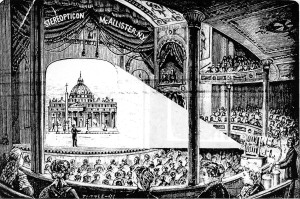Rosa Bell (b. 1902): Habits, Culture & Belief
In Rosa’s memoir, leisure activities and cultural practices are mentioned frequently throughout. There was a rise in mass entertainment during the mid to late 19th century, and this provided the working class with the opportunity to become consumers as well as providers. Some forms of entertainment include music halls which became active during this period. Pubs also became large, lit up open spaces for working class men.
Working class activities that Rosa participated in were introduced in the section about a man named Johnny that she knew, who she considered to be a “great organiser.” (pg. 26) He would arrange a magic lantern show for people in the village and that would stir much excitement for them. A magic lantern was an image projector used by the Victorians with the means to educate and entertain members of the public with pictures on sheets of glass. Education was about power and being made into an active citizen.

http://arthistoryresources.net/arth-technology/images/lanternslideshow1897.jpg
There would also be concerts held in Cumberland with: “such good singers & entertainers who came from a town not so far away.” (pg. 27) This sort of connects with the notion of there being a known community; that a variety of working glass groups would interact with one another and were not all entirely segregated by gender or district. The magic lantern slideshows seem quite appealing since it is entertainment for family therefore would include both men and women. Joanna Bourke in her book Working-Class Cultures in Britain, 1860-1960 explores how the interactions between several districts within the working class could have complications: “Relationships with kinsfolk and neighbours cannot be categorized simply as expressions of ‘community’. Rather, they were expressions of a series of negotiations whereby individuals combined over one issue and dispersed over another.” (pg. 159) The way in which Rosa describes the community relations in contrast to what Bourke states appear to be quite harmonious and evoke some very positive memories of hers.
Going to church was a special time not just for Rosa and her family but for whole communities to keep them together. It was a form of respectability within working class culture that was also available for both sexes.
Rosa often expressed her joy and excitement for the Christmas holidays: “… our own Pollie who entertained with her Cumberland Dialect Sketches you mentioned applause well I have never heard anything like it – this was real joy at Xmas time.” (pg. 27) This appears to be a distinct part of Rosa’s culture in Cumberland that focuses mainly on the people’s form of speech and dialect, whilst for others it can be dress codes.
Of course traditional feminine attributes such as cooking and sewing were present in the memoir: “How shifty the women were – never anything was wasted… They made quilts by hand too… of course now it is time to pass things to members of the family, but I do not think they value things as we used to do.” (pg. 126-7)
Rosa also remembers having to go and collect rents with her family would is something she was happy to do:
“I used to look forward to going to the village where most of the small bungalows & houses which belonged to his Employer were Sometimes he’d go on his bicycle – and I was so disappointed I could not go with him but on other Saturdays hed [he’d] say I’ll take you with me today and we’d walk the four miles together.” (pg. 44)
The importance of her family’s welfare is expressed here, even more so when Rosa follows this with the admission that she occasionally had to be placed: “in a home where there were lots of children and the mother was so wonderful and I was made so welcome with a large mug of tea and door step sandwiches.” (pg. 45) Despite hers and the other girls’ financial situations, they were still able to make themselves look presentable: “in spite of their poverty they could make themselves look so beautiful.” (pg. 46) and would take trips to the cinema and have pocket money to spend on sweets and small meals such as fish and chips.
Further Reading:
- Bell, Rosa. R.h.n. Remembers. Brunel University Library, July 1987.
- Bourke, Joanna. Working-Class Cultures in Britain, 1890-1960: Gender, Class and Ethnicity London: Routledge, 1994

Leave a Reply